陕西省黄陵中学2017-2018学年高二(重点班)上学期开学考试英语试题 Word版含答案
陕西省黄陵中学高新部2017-2018学年高二上学期期中考试英语试题含答案
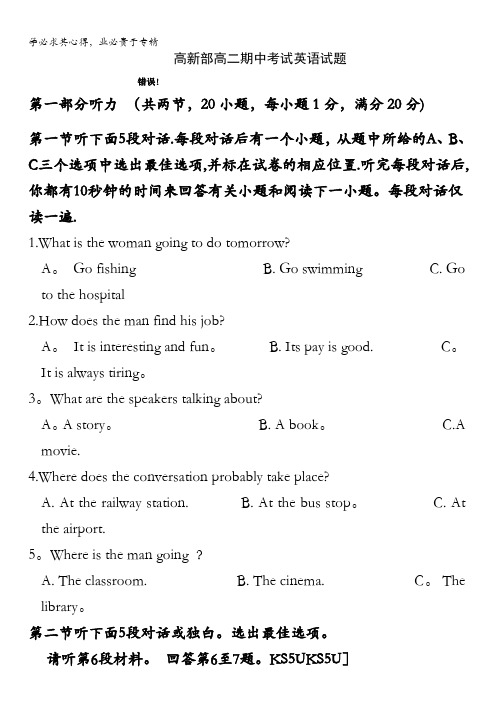
高新部高二期中考试英语试题错误!第一部分听力(共两节,20小题,每小题1分,满分20分)第一节听下面5段对话.每段对话后有一个小题,从题中所给的A、B、C三个选项中选出最佳选项,并标在试卷的相应位置.听完每段对话后,你都有10秒钟的时间来回答有关小题和阅读下一小题。
每段对话仅读一遍.1.What is the woman going to do tomorrow?A。
Go fishing B. Go swimming C. Go to the hospital2.How does the man find his job?A。
It is interesting and fun。
B. Its pay is good. C。
It is always tiring。
3。
What are the speakers talking about?A。
A story。
B. A book。
C.A movie.4.Where does the conversation probably take place?A. At the railway station.B. At the bus stop。
C. At the airport.5。
Where is the man going ?A. The classroom.B. The cinema. C。
The library。
第二节听下面5段对话或独白。
选出最佳选项。
请听第6段材料。
回答第6至7题。
KS5UKS5U]6.Why is the man going to the United States?A. To travel。
B. To visit his friends. C。
To attend a conference。
7.When will the man probably leave for the United States?A. In mid—February. B。
陕西省黄陵中学高新部2017-2018学年高二上学期开学考英语试题Word版含答案

高新部高二开学考试英语试题第I卷第一部份:听力(共两节,满分30分)第一节(共5小题;每小题分,满分分)听下面5段对话。
每段对话后有一个小题,从题中所给的A、B、C三个选项当选出最佳选项,并标在试卷的相应位置。
听完每段对话后,你都有10秒钟的时间来回答有关小题和阅读下一小题。
每段对话仅读一遍。
例:How much is the shirt?A. £ .B. £ .C. £ .答案是B。
1. Where did the woman probably leave her hat?A. In a restaurant.B. In a car.C. In a shop.2. What is the time right now?A. 7:15.B. 9:15.C.11:15.3. What are the speakers discussing?A. Whether to go to France.B. What to do in France.C. How to go to France.4. Why is the girl upset?A. Her family is about to move.B. Her mother is out of work.C. She has no friends now.5. What was the weather like in the Lake District on their holiday?A. Snowy.B. Sunny.C. Rainy. 第二节(共15小题;每小题分,满分分)听下面5段对活或独白。
每段对话或独白后有几个小题,从题中所给的A、B、C三个选项当选出最佳选项,并标在试卷的相应位置。
听每段对话或独白前,你将有时间阅读各个小题,每小题5秒钟;听完后,各小题将给出5秒钟的作答时间。
每段对话或独白读两遍。
听第6段材料,回答第6至7题。
2017-2018学年陕西省黄陵中学高新部高二上学期期末考试英语试题Word版含答案
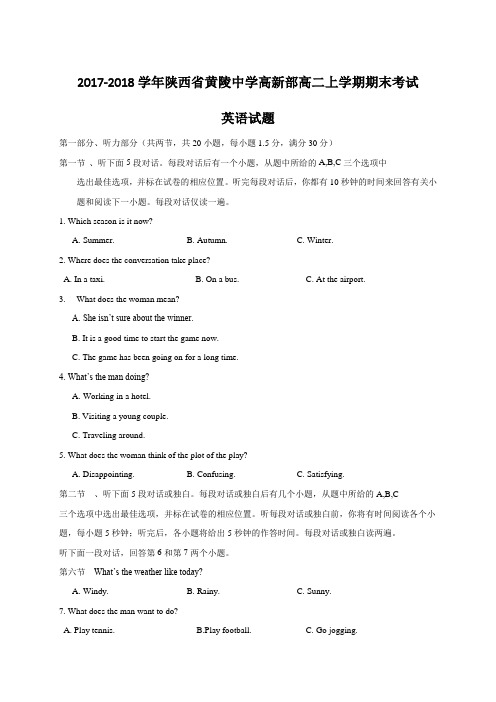
2017-2018学年陕西省黄陵中学高新部高二上学期期末考试英语试题第一部分、听力部分(共两节,共20小题,每小题1.5分,满分30分)第一节、听下面5段对话。
每段对话后有一个小题,从题中所给的A,B,C三个选项中选出最佳选项,并标在试卷的相应位置。
听完每段对话后,你都有10秒钟的时间来回答有关小题和阅读下一小题。
每段对话仅读一遍。
1. Which season is it now?A. Summer.B. Autumn.C. Winter.2. Where does the conversation take place?A. In a taxi.B. On a bus.C. At the airport.3.What does the woman mean?A. She isn’t sure about the winner.B. It is a good time to start the game now.C. The game has been going on for a long time.4. What’s the man doing?A. Working in a hotel.B. Visiting a young couple.C. Traveling around.5. What does the woman think of the plot of the play?A. Disappointing.B. Confusing.C. Satisfying.第二节、听下面5段对话或独白。
每段对话或独白后有几个小题,从题中所给的A,B,C三个选项中选出最佳选项,并标在试卷的相应位置。
听每段对话或独白前,你将有时间阅读各个小题,每小题5秒钟;听完后,各小题将给出5秒钟的作答时间。
每段对话或独白读两遍。
听下面一段对话,回答第6和第7两个小题。
第六节What’s the weather like today?A. Windy.B. Rainy.C. Sunny.7. What does the man want to do?A. Play tennis.B.Play football.C. Go jogging.听下面一段对话,回答第8和第9两个小题。
2017-2018学年陕西省黄陵中学高二(重点班)上学期第三学月考试英语试题+听力
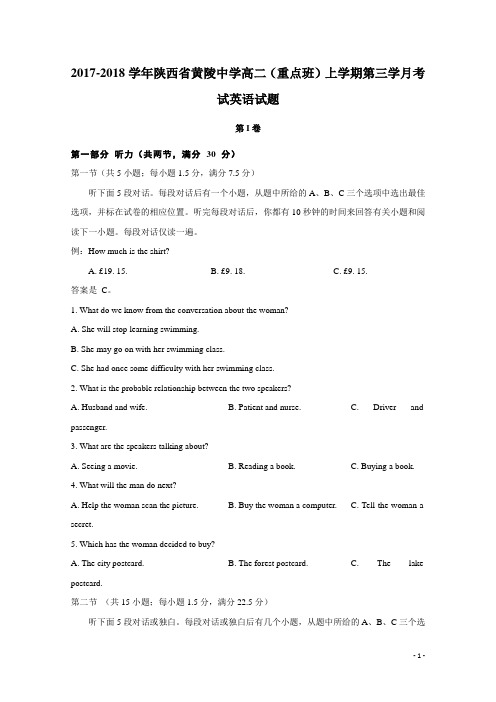
2017-2018学年陕西省黄陵中学高二(重点班)上学期第三学月考试英语试题第I卷第一部分听力(共两节,满分30 分)第一节(共5小题;每小题1.5分,满分7.5分)听下面5段对话。
每段对话后有一个小题,从题中所给的A、B、C三个选项中选出最佳选项,并标在试卷的相应位置。
听完每段对话后,你都有10秒钟的时间来回答有关小题和阅读下一小题。
每段对话仅读一遍。
例:How much is the shirt?A. £19. 15.B. £9. 18.C. £9. 15.答案是C。
1. What do we know from the conversation about the woman?A. She will stop learning swimming.B. She may go on with her swimming class.C. She had once some difficulty with her swimming class.2. What is the probable relationship between the two speakers?A. Husband and wife.B. Patient and nurse.C. Driver and passenger.3. What are the speakers talking about?A. Seeing a movie.B. Reading a book.C. Buying a book.4. What will the man do next?A. Help the woman scan the picture.B. Buy the woman a computer.C. Tell the woman a secret.5. Which has the woman decided to buy?A. The city postcard.B. The forest postcard.C. The lake postcard.第二节(共15小题;每小题1.5分,满分22.5分)听下面5段对话或独白。
英语-陕西省黄陵中学高新部2017-2018学年高二4月月考试题
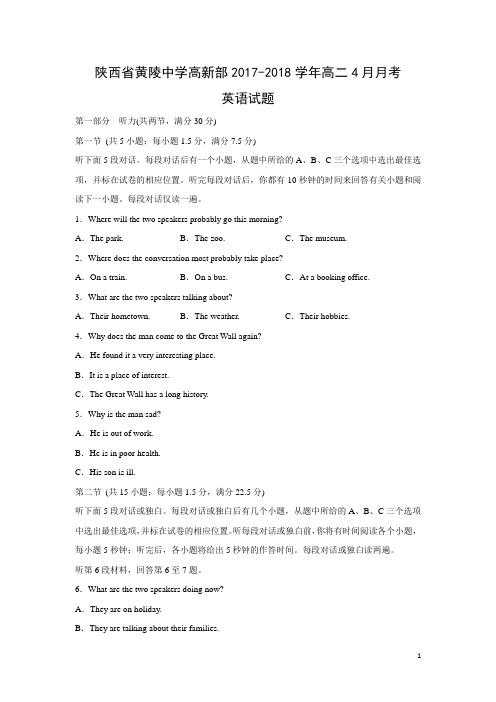
陕西省黄陵中学高新部2017-2018学年高二4月月考英语试题第一部分听力(共两节,满分30分)第一节(共5小题;每小题1.5分,满分7.5分)听下面5段对话。
每段对话后有一个小题,从题中所给的A、B、C三个选项中选出最佳选项,并标在试卷的相应位置。
听完每段对话后,你都有10秒钟的时间来回答有关小题和阅读下一小题。
每段对话仅读一遍。
1.Where will the two speakers probably go this morning?A.The park.B.The zoo. C.The museum.2.Where does the conversation most probably take place?A.On a train. B.On a bus. C.At a booking office.3.What are the two speakers talking about?A.Their hometown. B.The weather. C.Their hobbies.4.Why does the man come to the Great Wall again?A.He found it a very interesting place.B.It is a place of interest.C.The Great Wall has a long history.5.Why is the man sad?A.He is out of work.B.He is in poor health.C.His son is ill.第二节(共15小题;每小题1.5分,满分22.5分)听下面5段对话或独白。
每段对话或独白后有几个小题,从题中所给的A、B、C三个选项中选出最佳选项,并标在试卷的相应位置。
听每段对话或独白前,你将有时间阅读各个小题,每小题5秒钟;听完后,各小题将给出5秒钟的作答时间。
2017-2018学年陕西省黄陵中学高新部高二4月月考英语试题Word版含答案
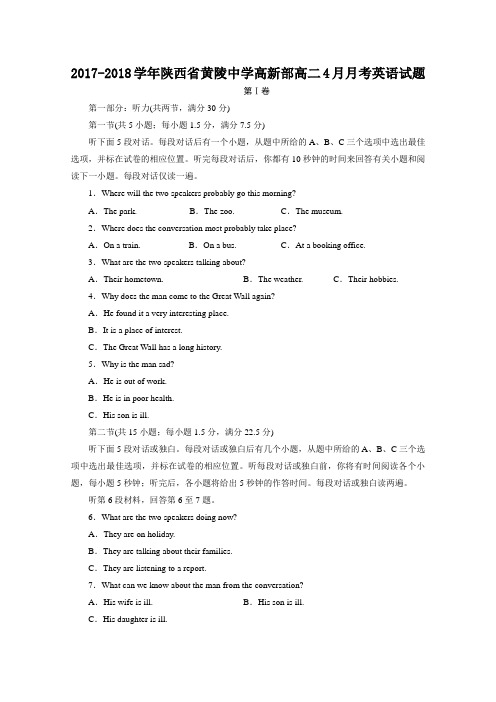
2017-2018学年陕西省黄陵中学高新部高二4月月考英语试题第Ⅰ卷第一部分:听力(共两节,满分30分)第一节(共5小题;每小题1.5分,满分7.5分)听下面5段对话。
每段对话后有一个小题,从题中所给的A、B、C三个选项中选出最佳选项,并标在试卷的相应位置。
听完每段对话后,你都有10秒钟的时间来回答有关小题和阅读下一小题。
每段对话仅读一遍。
1.Where will the two speakers probably go this morning?A.The park.B.The zoo. C.The museum.2.Where does the conversation most probably take place?A.On a train. B.On a bus. C.At a booking office.3.What are the two speakers talking about?A.Their hometown. B.The weather. C.Their hobbies.4.Why does the man come to the Great Wall again?A.He found it a very interesting place.B.It is a place of interest.C.The Great Wall has a long history.5.Why is the man sad?A.He is out of work.B.He is in poor health.C.His son is ill.第二节(共15小题;每小题1.5分,满分22.5分)听下面5段对话或独白。
每段对话或独白后有几个小题,从题中所给的A、B、C三个选项中选出最佳选项,并标在试卷的相应位置。
听每段对话或独白前,你将有时间阅读各个小题,每小题5秒钟;听完后,各小题将给出5秒钟的作答时间。
陕西省黄陵中学高新部2017-2018学年高二上学期第三学月考试英语试题
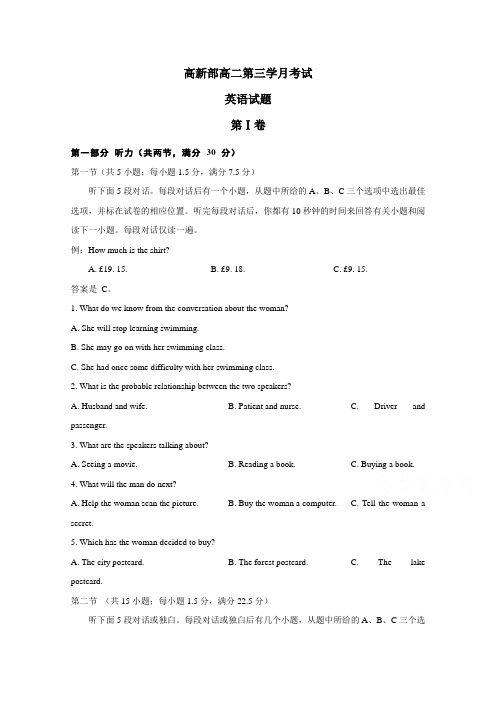
高新部高二第三学月考试英语试题第Ⅰ卷第一部分听力(共两节,满分30 分)第一节(共5小题;每小题1.5分,满分7.5分)听下面5段对话。
每段对话后有一个小题,从题中所给的A、B、C三个选项中选出最佳选项,并标在试卷的相应位置。
听完每段对话后,你都有10秒钟的时间来回答有关小题和阅读下一小题。
每段对话仅读一遍。
例:How much is the shirt?A. £19. 15.B. £9. 18.C. £9. 15.答案是C。
1. What do we know from the conversation about the woman?A. She will stop learning swimming.B. She may go on with her swimming class.C. She had once some difficulty with her swimming class.2. What is the probable relationship between the two speakers?A. Husband and wife.B. Patient and nurse.C. Driver and passenger.3. What are the speakers talking about?A. Seeing a movie.B. Reading a book.C. Buying a book.4. What will the man do next?A. Help the woman scan the picture.B. Buy the woman a computer.C. Tell the woman a secret.5. Which has the woman decided to buy?A. The city postcard.B. The forest postcard.C. The lake postcard.第二节(共15小题;每小题1.5分,满分22.5分)听下面5段对话或独白。
陕西省黄陵中学高三(重点班)上学期开学考试英语(英语)

陕西省黄陵中学2018届高三(重点班)上学期开学考试英语试题第I卷第一部分:听力(共20小题,每题1.5分,满分30分)第一节(共5小题,满分7.5分)听下面5段对话。
每段对话后有一个小题,从题中所给的A、B、C三个选项中选出最佳选项.并标在试卷的相应位置。
听完每段对话后,你都有10秒钟的时间来回答有关小题和阅读下一小题。
每段对话仅读一遍。
1. Which season is it now?A. Summer.B. Autumn.C. Winter.2. How might the woman feel?A. Annoyed.B. Satisfied.C. Excited.3. What does the woman want to know?A. Who the lady is.B. Where the bar is.C. What the time is now.4. What will the woman probably do next?A. Leave the house.B. Brush her teeth.C. Clean the car.5. What does the man offer to do?A. Give the woman a ride.B. Call a taxi for the woman.C. Fix the car for the woman.第二节(共15小题;每小题1.5分,满分22.5分)听下面5段对话或独白。
每段对话或独白后有几个小题,从题中所给的A、B、C三个选项中选出最佳选项,并标在试卷的相应位置。
听每段对话或独白前.你将有时间阅读各个小题.每小题5秒钟;听完后,各小题给出5秒钟的作答时间。
每段对话或独白读两遍。
听第6段材料,回答第6、7题。
6. What does the man suggest doing?A. Watching a movie.B. Eating some candy.C. Going to bed right away.7. Why is the woman so tired?A. She helped her neighbor with some workB.She took some kids to dinner.C. She celebrated a festival.听第7段材料,回答第8、9题。
- 1、下载文档前请自行甄别文档内容的完整性,平台不提供额外的编辑、内容补充、找答案等附加服务。
- 2、"仅部分预览"的文档,不可在线预览部分如存在完整性等问题,可反馈申请退款(可完整预览的文档不适用该条件!)。
- 3、如文档侵犯您的权益,请联系客服反馈,我们会尽快为您处理(人工客服工作时间:9:00-18:30)。
高二重点班开学考试英语试题第Ⅰ卷第一部分听力(共两节,满分30分)做题时,先将答案标在试卷上。
录音内容结束后,你将有两分钟的时间将试卷上的答案转涂到答题卡上。
第一节(共5小题,每小题1.5分,满分7.5分)听下面5段对话。
每段对话后有一个小题,从题中所给的A、B、C,三个选项中选出最佳选项,并标在试卷的相应位置。
听完每段对话后,你都有10秒钟的时间来回答有关小题和阅读下一小题。
每段对话仅读一遍。
1. What does the woman imply?A. For the first time the team has become the league champion.B. The team did a good job again this time.C. The team has little chance to win this time.2. What program does the man generally listen to?A. News.B. Talk shows.C. Education program.3. Where is the conversation taking place?A. In a park.B. In a museum.C. In a pet store.4. How does Mike feel?A. Satisfied.B. Puzzled.C. Worried.5. What does the woman mean?A. She doesn’t understand the man.B. She gave the change to someone else.C. She’s unable to help the man.第二节(共15 小题;每小题1分,满分22.5分)听下面5段对话或独白。
每段对话或独白后有几个小题,从题中所给的A、B、C三个选项中选出最佳选项,并标在试卷的相应位置。
听完每段对话或独白前后,你将有时间阅读各个小题,每小题5秒钟;听完后,各小题将给出5秒钟的作答时间。
每段对话或独白读两遍。
听第6段材料,回答第6、7题。
6. Why is the woman talking to the man?A. Because of the poor quality of the goods she bought.B. Because of not getting the promised discount.C. Because of the impolite attitude of the salesgirl.7. What will the man give to the woman?A. Some money.B. A letter of apology.C. A new product.听第7段材料,回到第8-10题。
8. Which place would the man like to go?A. An exciting modern city.B. A popular tourist attraction.C. A quiet and far-away place.9. What does the woman worry about?A. The weather.B. The food and water.C. The language.10. What does the woman plan to do now?A. Travel with the man.B. Do some gardening.C. Go to the travel agency.听第8段材料,回答第11-13题。
11. How often does the man contact his aunt?A. Once a month.B. Once a week.C. Seldom.12. Why didn’t his aunt chat with him online?A. Her kids keep her busy all the time.B. She does not have a computer in her house.C. She’s not interested in using the computer.13. What will he do next?A. Ask his cousins for help.B. Teach his aunt himself.C. Ask his uncle for help.听第9段材料,回答第14-17题。
14. Who is the woman?A. A police officer.B. An immigration official.C. An air hostess.15. Which line is for the residents?A. The line on the man’s right.B. The line on the woman’s left.C. The line on the woman’s right.16. How long will the man study in the UK?A. For a few months.B. For a year.C. For two years.17. How will the man pay for living costs and tuition fees?A. His father has paid for that in advance.B. He has won a scholarship.C. He will take a part-time job to pay for that.听第10段材料,回答第18-20题。
18. What is the talk mainly about?A. How to keep young.B. How to improve memory.C. How to open our mind.19. What is the key to achieving this goal?A. Going back to school.B. Playing no attention to age.C. Using the mind as much as possible.20. What did the man who entered school at 70 become later?A. An active lawyer.B. A successful doctor.C. A highly paid artist.第二部分阅读理解(共两节,满分40分)第一节(共15小题;每小题2分,满分30分)阅读下列短文,从每题所给的四个选项(A、B、C和D)中,选出最佳选项。
AInternational Exhibition for Animal Husbandry(畜牧业)& Processing of Grain,Fruits & VegetablesDate: 11-13 August,2015Place: London,EnglandRegistration Deadline: 30 June,2015Exhibition and MarketThe marketThe British agricultural market provides very good chances for international companies since the demand for modern technologies is continuously rising.And the existing market can't satisfy the local development.Great potential is to be found also in livestock(家畜)and livestock farming.In particular,investment in cattle farming and pig husbandry is to be further increased.The exhibitionIt is the most important platform for animal husbandry and agricultural technology in st year,537 companies from 14 countries showed their advanced solutions for livestock,animal husbandry and agricultural technology to over 13,540 business professionals.OrganizerLondon International Contract Fair and IF Wexpo Heidelberg GmbH Heidelberg,GermanyPhone: +49-(0)6221 -13 57 -0Fax: +49-(0)6221 -13 57 -23Opening time11 August-12 August,2015 ,09:00-16:3013,August,2015,09:00 -15:30Main IndustriesAgricultural Technology,Cereal Grain Technology,Animal HusbandryMain TopicsEquipment for soil working and seed-bed preparation●Harvesting equipment●Plant breeding (繁殖)●Plant protection●Grain processing●Storage and transport●Animal breeding●Animal husbandry●Livestock housing●Feed industryEntrance fee2,000 pounds/per stand/per day21.The text tells us the following information EXCEPI______.A.the time of the exhibitionB.the topics of the exhibitionC.the rules of the exhibitionD.the site of the exhibition22.Which of the following statements is true?A.London has the largest agricultural market in the world.B.International companies can find more business opportunities in the British agricultural market.C.Almost all countries in the world take part in the exhibition.D.The exhibition covers all kinds of living goods.23.If you want to take part in the exhibition,you______.A.can contact the organizer in three waysB.must register between 30 June and 13 August,2015C.have to buy some equipment on display during the exhibitionD.need not pay the organizer of the exhibitionBWe all have our ways of marking time.My life is measured by taking pictures from one story to the next.My oldest son was born in the middle of a long story about endangered animals.My daughter came along with a pack of gray wolves.It's the story in Alaska that I'll remember best,though.It was the story about the loss of wild land,during which my wife Kathy got cancer.That's the one that made time stand still.With anxiety,I stopped taking pictures on the day when she found that tumor(肿瘤).Cruelly,it was Thanksgiving Day.Early examination saves time.But ours was not early.By the time you can feel it yourself,it's often bigger than the doctor wants it to be.Cancer is a thief.It steals time.Our days are already short with worry.Then comes this terrible disease,unfair as storm at harvest time.But cancer also has the power to change us,for good.We learn to simplify it,enjoying what we have instead of feeling sorry for what we don't.Cancer even makes me a better father.My work has made me a stranger to my three kids.But now I pay attention to what really matters.This is not a race.This is a new way of life and a new way of seeing,all from the cancer.In the end each of us has so little time.We have less of it than we can possibly imagine.And even though it turns out that Kathy's cancer has not spread,and her prognosis(预断)is good.We try tomake it all count now,enjoying every part of every day.I've picked up my camera again.I watch the sky,searching for beautiful light.When winter storms come,Kathy and I gather our children and take the time to catch snowflakes(雪花)on our tongues.After all,this is good.This is what we're living for.24.What is the writer?A.A sponsor.B.A doctor.C.A photographer.D.A director.25.How did the writer feel after knowing Kathy's disease?A.Anxious.B.Innocent.C.Powerful.D.Optimistic.26.What effect has the cancer had on the author?A.He focuses much more on his work.B.He spends more time with his family.C.He becomes a stranger to his children.D.He devotes much more to medical care.27.What can be inferred from the passage?A.Cancer steals time.B.Kathy's cancer has spread.C.Snowflakes make the family feel cool.D.The author takes a different way of life.CIf you're thinking about reaching for another biscuit to get you through the working day,think again.Eating unhealthy snacks at your desk makes you pile on almost half a stone a year,a survey has revealed.The waistlines of women suffer the most,with the average female putting on 61b 3oz—the equivalent of a whole dress size—while men see their weight increase by 51b 20z.The report into our eating habits found that,on average,we eat at least two snacks a day,with 30 percent of us tucking into three or more.Women admit eating more than men,with a further 13 percent of ladies scoffing four or more snacks a day.The research,by The Village Bakery,found biscuits are the most common vice,with 42 percent regularly opening a pack,closely followed by chocolate (38 percent),crisps (32 percent) and cakes (13 percent).And office workers are worse than most.Cakes and biscuits brought into work by colleagues are one of the main temptations office staff give in to.In addition,33 percent admit reaching for nibbles to cope with stress and 22 percent say they need a sugar rush to perk them up in the afternoon.Simon Staddon,of The Village Bakery,said:"We were aware time-poor office workers can find it difficult to easily access a nutritional lunch.But we were really shocked by the extent to which 'quick fix' lunches are affecting weight gain and general well-being.Popular mid-afternoon pick-me-ups such as biscuits, chocolate and cakes are high in calories,fat and full of sugar,all of which affect your blood sugar levels and ultimately lead to weight gain."The survey of 2,000 British men and women suggests we are often ashamed of our unhealthy eating. Twenty-four percent of Britons admit lying about how many snacks they eat with 33 percent of women lying, compared to 20 percent of men.Unfortunately,it's as if we are not likely to doanything positive to counteract the sweet treats.28.According to the passage,women usually put weight on first______.A.on the faceB.on the legsC.on the feetD.in the middle29.What's the main reason of eating snacks in the office?A.Colleagues eat them to save money.B.Staff use them to cope with their lunches.C.Colleagues often bring them to office.D.Bosses invite staff to eat them.30.Why do office workers eat a "quick fix" lunch?A.Because it has much of nutrition.B.Because it has little effect on weight gain.C.Because it has little effect on general well-being.D.Because they have a short time to have their lunches.31.It can be inferred that British women are______.A.less likely to lie on snacks than menB.more likely to lie on snacks than menC.more ashamed of eating snacks than menD.less ashamed of eating snacks than menDWhenever something looks interesting or beautiful,there's a natural impulse to catch and own it—which means, in this day and age,that we can't help reaching for our phones to take a picture when seeing beautiful things.Though this would seem to be a wonderful solution,there are two big problems about taking pictures.Firstly, we're likely to be so busy taking the pictures that we forget to look at the world whose beauty and interest inspire us to take a photograph in the first place.And secondly,because we feel the pictures are safely stored in our phones,we never get around to look at them.These problems would seem to be very much of today,a consequence of the tiny phones in our pockets.But they were noticed right at the beginning of the history of photography,when the average camera was the size of a grandfather clock.The first person who noticed them was the English art critic,John Ruskin.He was a travelling lover who realized that most tourists failed to notice or remember the beautiful things they saw.He argued that humans have a born tendency(倾向)to respond to beauty and desire to keep it,but that there are bad expressions of this desire.At worst,we get into buying souvenirs or taking photographs.But,in Ruskin's eyes, there's one thing we should do and that is attempting to draw the interesting things we see,and it doesn't matter whether we happen to have any talent for doing so.Before the invention of photography,people used to draw far more than they do today.It was an active necessity. But in the mid-19th century,photography killed drawing.It became something only "artists" would ever do,so Ruskin spent four years on a campaign to get people drawing again.So if drawing had value even when it was practiced by people with no talent,it was for Ruskin because drawing can teach us to notice properly rather than watch absent-mindedly(心不在焉地).When describing what lies before our eyes with our own hands,we naturally move from a position of observing beauty in a loose way to one where we acquire a deep understanding of its parts.32.What does the underlined word "impulse" mean?A.Interest.B.Urge.C.Habit.D.Reaction.33.What does Paragraph 2 mainly talk about?A.An effective solution to storing something nice.B.Reasons for taking pictures in the first place.C.Problems related with taking photos.D.Methods of storing pictures in phones.34.It can be inferred that John Ruskin______.A.lived at the origin of photographyB.lived at the origin of drawingC.studied the history of photographyD.was an English literature critic35.How did John Ruskin advise us to remember our travel?A.By taking photographs.B.By buying meaningful souvenirs.C.By writing some travel notes.D.By trying drawing what we see.第二节(共5小题:每小题2分,满分10分)根据短文内容,从短文后的选项中选出能填入空白处的最佳选项。
